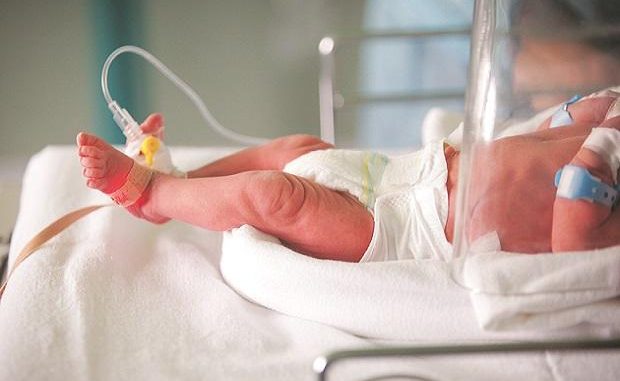
Preterm babies either die within few weeks of their birth or they live with severe problems such as they get sick a lot, and find it hard to learn, hear or see through their life
Ankur Paliwal | New Delhi Last Updated at November 2, 2019 23:46 IST
Can you predict premature births? Scientists in India are trying to figure out. Over the last four years they have been recruiting women early in their pregnancy and collecting lots of data from them in an ongoing study. The idea is to eventually develop algorithms that can inform doctors how likely is it for a woman to deliver her baby before the 37-weeks of pregnancy. About 15 million babies are born preterm in the world. Highest percentage (23.6 per cent) of them are in India.
Preterm births are increasing across the globe. While less than 10 per cent of such babies die in high-income countries, upto 90 per cent of them die in low-and-middle income countries. India contributes to a quarter of all such deaths in the world. Preterm babies either die within few weeks of their birth or they live with severe problems such as they get sick a lot, and find it hard to learn, hear or see through their life. However, what all causes preterm births is not well understood, especially in developing countries. Various biological, social, psychological and environmental factors (which vary geographically) together contribute to preterm births.
But most studies about preterm have looked at single contributing factor such as exposure to indoor pollution at a time. “Preterm births have been studied mostly in a siloed manner,”said Shinjini Bhatnagar, dean of clinical research at Faridabad based Translational Health Science and Technology Institute or THSTI, which is coordinating the study. So, this study brings together experts from various disciplines. Another issue that the studies on preterm births have had is that they investigate causes after babies are born. “That’s too late,” saidBhatnagar who is also the principal investigator in the study.
So, researchers have recruited more than 7000 women early in their pregnancy, andare closely following them through their pregnancy at the district hospital of Gurgaon where they come for regular health check-ups. There researchers collect various kind of data from them such as their age, education, family income, sanitation, house electrification, diet, weight, indoor air pollution, whether they have given preterm births before, interval between their previous pregnancies, and whether they were born preterm themselves. All the data are being analyzed and will be later fed into models to see how different risk factors interact with each other and what combinations of them could lead to preterm births. But so little is understood about such births that even most of the known risk factors together make for only 10 per cent of the factors linked to babies born too early, suggests the preliminary data of the study. “That means 90 per cent of other predictors are still unknown,” said Ramachandran Thiruvengadam, a paediatrician involved in the primarily funded by the Department of Biotechnology of the Indian government.
Thatgap led researchers to collect biological samples such as saliva, urine, placenta and vaginal secretions from the women in the study to look for more signs of preterm birth.
Researchers will, for example, compare various kinds of proteins and microorganisms that are present in the vaginal secretionsof women who deliver their babies preterm with vaginal secretions of women who gave normal births tocheck if there are any differences.These data too will later be fed in the models to predict preterm births. The algorithms might help them design specific interventions which could be targeted at a particular time in the pregnancy to prevent preterm births, said Bhatnagar. However, Siddarth Ramji, pediatrics professor at the Maulana Azad Medical College in New Delhi says that medical interventions alone won’t prevent preterm births. A preterm birth is a symptom of a deeper sociopolitical and medical problem, which will require interventions from various directions and answering questions such as how to alter a family’s poverty or change a community’s behavior, he said.
Some causes of preterm births are known, nobody has been able to trace back reasons of about 30-40 percent of preterm births globally, which is where the studies like the ones led by Bhatnagar are really important, said Ramji.
Another major objective of this study is to generate data that are representative of developing countries. About 90% of the data points in the international modelling datasets come from high income countries, which account for less than 5 per cent of preterm births in the world, according to a Lancet paper.
The study is already generating data to fill that gap. For example, the Institute of Medicine in the United States recommend that women with average weight before pregnancy gain a between 11.5kg and 16 kg during their pregnancy. However, researchers found that the 75 per cent women in study gained less than 11.5 kg during their pregnancy, and the mean weight gain only 8.5 kg. That difference in itself is likely to influence how fetuses grow inside an average Indian women, said Bhatnagar. “Our babies are not growing as well as they should.”
Although the researchers expect to publish some concrete findings later in next couple of months about how pregnant women in India gain weight and how fetuses grow, it might take couple of years for models to take shape given how incredibly complex the whole thing is.
First Published: Sat, November 02 2019. 23:33 IST
read the full story about Indian scientists developing new algorithm to help predict preterm births
#theheadlines #breakingnews #headlinenews #newstoday #latestnews #aajtak #ndtv #timesofindia #indiannews
